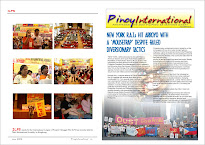by Butch M. Pongos
Japan Correspondent
Will the trade deal with Japan deliver its promise of economic gains for the Philippines? Filipinos in Japan say no.
This was the overwhelming consensus of Filipino migrants in Japan who are wary of the JPEPA (Japan-Philippines Economic Partnership Agreement), a bilateral free-trade agreement signed by Japan and the Philippines in September 2006. The said agreement was ratified by the Japanese Diet in December 2006. It now awaits similar ratification by the Senate of the 14th Philippine Congress.
What is in JPEPA that Filipinos should celebrate when provisions in the agreement that were secretly negotiated and kept from the public are clearly tilted in favor of Japan despite claims by the Arroyo government that the Philippines is poised to gain from the said deal?
JPEPA to government economic planners is heralded as a “milestone in the continuing cooperation and collaboration (between Japan and the Philippines), setting a new chapter of strategic partnership for mutual opportunity and growth.” It is a comprehensive plan that encourages the opening up of markets for goods and services and removing barriers and restrictions on trade and investments. It is one “mega treaty” that encompasses the Philippines’ original commitments to the WTO.
The 965-page agreement has whose 16 chapters, 165 articles and 8 annexes covering 14 major areas of economic cooperation. It promises substantial economic gains that will accrue to almost all sectors of the economy, according to its proponents in Malacanang.
Easing restrictions
But perhaps one area in the agreement that the Arroyo government and its economic planners are so ecstatic about is the prospect of capturing the Japan market for overseas employment, particularly the easing up of restrictions on nurses and caregivers. Under the JPEPA agreement on “Movement of Natural Persons”, Japan will ease restrictions on the entry of health workers from the Philippines by hiring 400-500 nurses and care workers each year once the agreement takes effect.
A careful scrutiny of these particular provisions in the JPEPA, however, casts doubts on the agreements’ purported immediate and long term benefits for the Filipino people. First, would these provisions translate into real opening of the Japan labor market for Filipino nurses and care workers or will it be only in paper? What about the social cost of increased labor export to Japan and the strains it would have on the Philippine healthcare system?
If people think that JPEPA would open Japan’s door towards the entry of Filipino nurses and care workers just like that, they might be in for a big surprise. Yes, Japan has an aging population that needs foreign nurses and care workers to fill in the dearth in healthcare workers. But lest policy makers forget, Japan traditionally has been closed to the entry of foreign migrant labor for fear that opening up its door might have serious repercussions on its own domestic economy. And for a long time, local population has not been conditioned to accept foreigners for they believe that foreign migrant workers compete with local workers for jobs that are slowly declining.
Language test
JPEPA stipulates that only licensed nurses from the Philippines with three years experience can apply. In order to qualify (as a nurse or as caregiver), applicants must undergo extensive training in Japan including language training for six months. After completing the training, applicants must undergo on-the-job training in hospitals under the direct supervision of a duly registered nurse in Japan (kagoshi) for nurses or a certified care worker (kaigofukushishi) for caregivers. And finally, after completion of the on-the-job training, applicants must then pass the Japan licensure examination before they can become eligible for hiring.
The stringent processes and procedures and the host of requirements are tough. It’s like “going through the eye of a needle” as Senator Mar Roxas put it during a Senate committee hearing in November 2006.
Passing the language test alone would certainly be a difficult hurdle for nurses and care workers from the Philippines. This is not to undermine the ability of Filipinos to adapt to foreign culture and environment which proudly they are known for the world over. But for all intents and purposes, how can Filipino nurses and care workers compete with their local counterparts if they hardly speak, nor read Japanese?
But perhaps the more critical question is would Filipino nurses and care workers actually benefit once they are hired?
Bottom labor market
Observers are afraid that Filipino nurses and care workers who may be able to penetrate the Japan labor market would be relegated to minor positions in hospitals and care facilities rather than become full pledge nurses and caregivers. As one analyst observes, Filipino nurses and care workers might be integrated into the bottom level of Japanese labor market and forced to compete with part-time workers even though they possess professional skills.
Under the system of “dispatched labor” in Japan, workers (foreign migrants included) face unstable working conditions. More than 70% of contracts are good for just one year, and therefore, workers may not have a chance to truly develop skills and enjoy the same level of social benefits like full-time workers. The system is a new form of deprivation similar to the one employed under the “trainee system” in Japan and South Korea wherein unskilled workers from the Philippines are dispatched to the receiving country purportedly to acquire skills but end up like ordinary workers in small factories and sweatshops doing 3D (difficult, dirty and dangerous) jobs in exchange for measly allowances with no social benefits at all.
Hiring 400-500 nurses and care workers each year is too miniscule a price in exchange for allowing Japanese big business to rake in super profits out of the local economy which is what JPEPA is all about. In the end, the social costs associated with overseas employment, may far outweigh the purported benefits being offered by JPEPA to Filipino healthcare practitioners.
The Japan-Philippine Economic Partnership Agreement is a “shot-in-the-air”, so to speak. It was haphazardly concluded and kept from public scrutiny especially from those whose economic interests face serious threats from the neo-liberalization policy being pushed by the said agreement. It is a sham deal that belies its own promise of a brighter economic future for the Filipino people and seriously undermines the integrity and sovereignty of the Philippines.
Now, it is up for the Filipino people if they will allow the Philippine Senate to ratify this agreement or heighten their protest to outrightly reject it.
Japan Correspondent
Will the trade deal with Japan deliver its promise of economic gains for the Philippines? Filipinos in Japan say no.
This was the overwhelming consensus of Filipino migrants in Japan who are wary of the JPEPA (Japan-Philippines Economic Partnership Agreement), a bilateral free-trade agreement signed by Japan and the Philippines in September 2006. The said agreement was ratified by the Japanese Diet in December 2006. It now awaits similar ratification by the Senate of the 14th Philippine Congress.
What is in JPEPA that Filipinos should celebrate when provisions in the agreement that were secretly negotiated and kept from the public are clearly tilted in favor of Japan despite claims by the Arroyo government that the Philippines is poised to gain from the said deal?
JPEPA to government economic planners is heralded as a “milestone in the continuing cooperation and collaboration (between Japan and the Philippines), setting a new chapter of strategic partnership for mutual opportunity and growth.” It is a comprehensive plan that encourages the opening up of markets for goods and services and removing barriers and restrictions on trade and investments. It is one “mega treaty” that encompasses the Philippines’ original commitments to the WTO.
The 965-page agreement has whose 16 chapters, 165 articles and 8 annexes covering 14 major areas of economic cooperation. It promises substantial economic gains that will accrue to almost all sectors of the economy, according to its proponents in Malacanang.
Easing restrictions
But perhaps one area in the agreement that the Arroyo government and its economic planners are so ecstatic about is the prospect of capturing the Japan market for overseas employment, particularly the easing up of restrictions on nurses and caregivers. Under the JPEPA agreement on “Movement of Natural Persons”, Japan will ease restrictions on the entry of health workers from the Philippines by hiring 400-500 nurses and care workers each year once the agreement takes effect.
A careful scrutiny of these particular provisions in the JPEPA, however, casts doubts on the agreements’ purported immediate and long term benefits for the Filipino people. First, would these provisions translate into real opening of the Japan labor market for Filipino nurses and care workers or will it be only in paper? What about the social cost of increased labor export to Japan and the strains it would have on the Philippine healthcare system?
If people think that JPEPA would open Japan’s door towards the entry of Filipino nurses and care workers just like that, they might be in for a big surprise. Yes, Japan has an aging population that needs foreign nurses and care workers to fill in the dearth in healthcare workers. But lest policy makers forget, Japan traditionally has been closed to the entry of foreign migrant labor for fear that opening up its door might have serious repercussions on its own domestic economy. And for a long time, local population has not been conditioned to accept foreigners for they believe that foreign migrant workers compete with local workers for jobs that are slowly declining.
Language test
JPEPA stipulates that only licensed nurses from the Philippines with three years experience can apply. In order to qualify (as a nurse or as caregiver), applicants must undergo extensive training in Japan including language training for six months. After completing the training, applicants must undergo on-the-job training in hospitals under the direct supervision of a duly registered nurse in Japan (kagoshi) for nurses or a certified care worker (kaigofukushishi) for caregivers. And finally, after completion of the on-the-job training, applicants must then pass the Japan licensure examination before they can become eligible for hiring.
The stringent processes and procedures and the host of requirements are tough. It’s like “going through the eye of a needle” as Senator Mar Roxas put it during a Senate committee hearing in November 2006.
Passing the language test alone would certainly be a difficult hurdle for nurses and care workers from the Philippines. This is not to undermine the ability of Filipinos to adapt to foreign culture and environment which proudly they are known for the world over. But for all intents and purposes, how can Filipino nurses and care workers compete with their local counterparts if they hardly speak, nor read Japanese?
But perhaps the more critical question is would Filipino nurses and care workers actually benefit once they are hired?
Bottom labor market
Observers are afraid that Filipino nurses and care workers who may be able to penetrate the Japan labor market would be relegated to minor positions in hospitals and care facilities rather than become full pledge nurses and caregivers. As one analyst observes, Filipino nurses and care workers might be integrated into the bottom level of Japanese labor market and forced to compete with part-time workers even though they possess professional skills.
Under the system of “dispatched labor” in Japan, workers (foreign migrants included) face unstable working conditions. More than 70% of contracts are good for just one year, and therefore, workers may not have a chance to truly develop skills and enjoy the same level of social benefits like full-time workers. The system is a new form of deprivation similar to the one employed under the “trainee system” in Japan and South Korea wherein unskilled workers from the Philippines are dispatched to the receiving country purportedly to acquire skills but end up like ordinary workers in small factories and sweatshops doing 3D (difficult, dirty and dangerous) jobs in exchange for measly allowances with no social benefits at all.
Hiring 400-500 nurses and care workers each year is too miniscule a price in exchange for allowing Japanese big business to rake in super profits out of the local economy which is what JPEPA is all about. In the end, the social costs associated with overseas employment, may far outweigh the purported benefits being offered by JPEPA to Filipino healthcare practitioners.
The Japan-Philippine Economic Partnership Agreement is a “shot-in-the-air”, so to speak. It was haphazardly concluded and kept from public scrutiny especially from those whose economic interests face serious threats from the neo-liberalization policy being pushed by the said agreement. It is a sham deal that belies its own promise of a brighter economic future for the Filipino people and seriously undermines the integrity and sovereignty of the Philippines.
Now, it is up for the Filipino people if they will allow the Philippine Senate to ratify this agreement or heighten their protest to outrightly reject it.







0 comments:
Post a Comment